News feed
Botond Roska, BME’s Neumann Professor, and Zoltán Demjén, Honorary Citizen of the University
2025. 06. 06.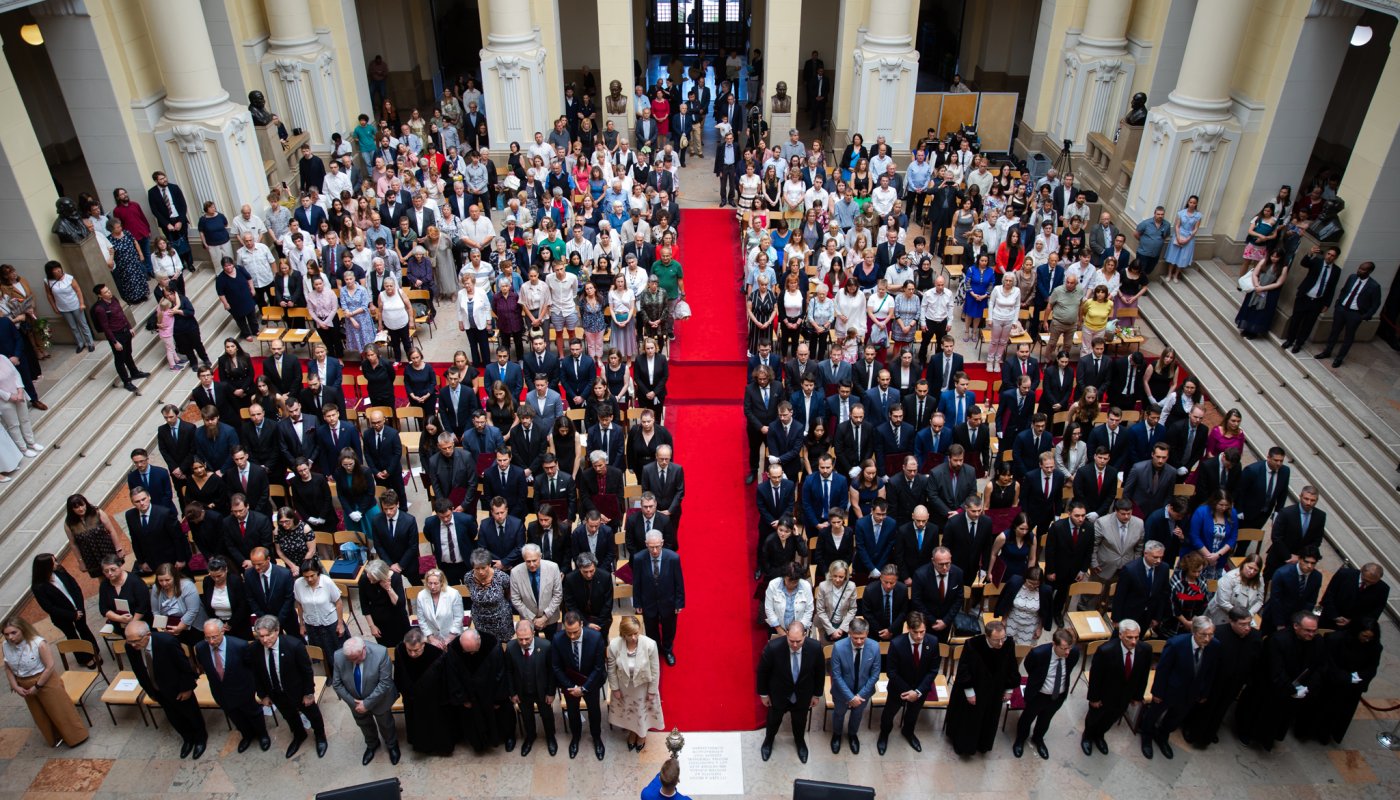
Honorary doctoral and Industry Professor titles as well as other awards were presented at the ceremonial meetings of the BME Senate.
On Saturday, the BME Senate held this year’s traditional ceremonial meeting, where the most prestigious institutional and professional awards of the university were presented. After the Hungarian national anthem, personal secretary to the rector Eszter Mozsár, acting as the moderator of the event, greeted the guests: Botond Roska, Professor of Neurobiology, Balázs Hankó, Minister of Culture and Innovation, Veronika Varga-Bajusz, State Secretary for Higher Education, Vocational and Adult Education and Youth Affairs, and Iván Vetési, CEO of BME Fenntartó Zrt.;
Balázs Gulyás, President of the HUN-REN Hungarian Research Network, Roland Jakab, President of the BME Circle of Supporters and Friends, Béla Merkely, Rector of Semmelweis University, President of the Hungarian Rectors’ Conference, Levente Kovács, President of the John von Neumann Computer Society, Rector of the Óbuda University, János Pakucs, President of the Pro Progressio Foundation, Dale Martin, President of the EELISA European University Alliance, Miklós Bendzel, President of the Hungarian Academy of Engineering and Géza Kuminetz, Rector of Pázmány Péter Catholic University; and the leaders of the BME: Rector Charaf Hassan, Vice Chancellor András Pálfalvi, Szabolcs Rózsa, Dean of the Faculty of Civil Engineering, Imre Orbulov, Dean of the Faculty of Mechanical Engineering, György Alföldi, Dean of the Faculty of Architecture, András Szarka, Dean of the Faculty of Chemical Technology and Biotechnology, Imre Sándor, Dean of the Faculty of Electrical Engineering and Informatics, István Varga, Dean of the Faculty of Transportation Engineering and Vehicle Engineering, Attila Aszódi, Dean of the Faculty of Natural Sciences, Tamás Koltai, Dean of the Faculty of Economic and Social Sciences, László Nyulászi, Chairperson of the Habilitation Committee and Doctoral Council of the University, Imre Lévai, Chairperson of the University Students’ and Doctoral Students’ Representation, Gábor Péceli, academician and former rector of the university, Péter Bihari Vice Rector for Education, János Levendszovky Vice Rector for Research and Innovation, András Nemeslaki, Vice Rector for International Affairs and Gergely Zaránd, Vice Rector for Scientific Affairs.
In his opening speech, Rector Charaf Hassan quoted István Széchenyi, the initiator of the founding of the Hungarian Academy of Sciences, which celebrates its 200th anniversary this year, who wrote in his book Hitel (Credit) that “The number of scientific people constitutes the nation’s real power”. “The BME listens to the greatest of the Hungarians: there are currently 750 doctoral students at the university, and our goal is to reach 1000 by 2030 and 1500 by 2035,” the rector said.
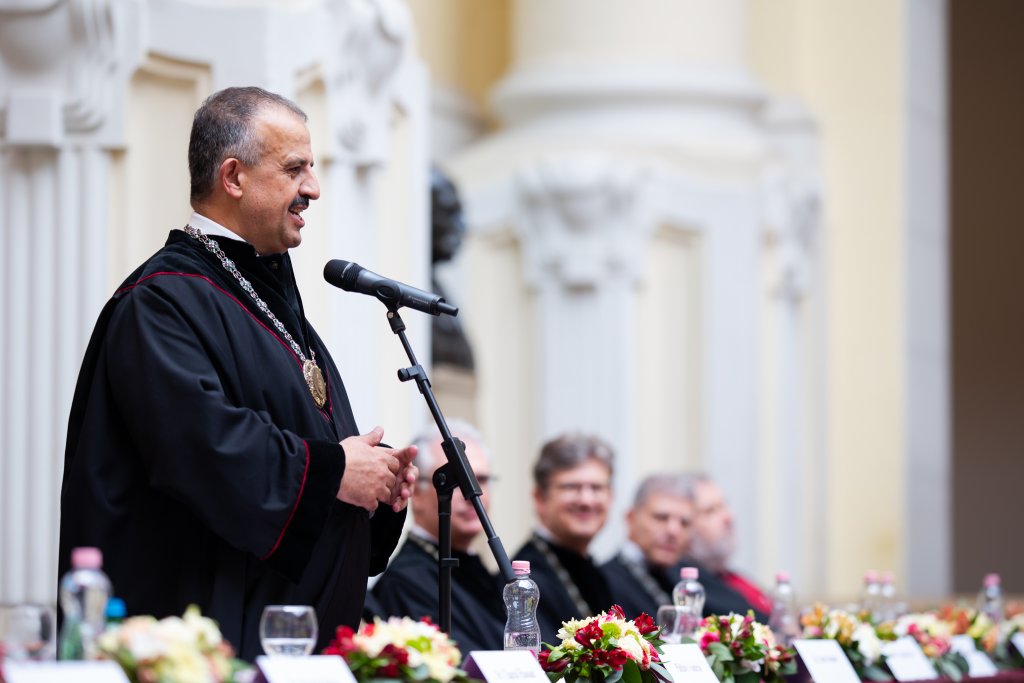
The Rector and István Szászi
He added that in a few days’ time, former BME student Tibor Kapu would be launched into space, who certainly could rely on the sound technical knowledge gained at the BME during the selection and preparation process. Just like the mission’s reserve astronaut, Gyula Cserényi, and even their predecessor, Bertalan Farkas, who was the first Hungarian in space some 45 years, also graduated from the BME.
“Hungarian higher education is becoming more competitive, but this competition is not an end in itself: we are all serving our nation,” said Balázs Hankó in his speech. Addressing the lecturers and researchers present, he said, “you are the ones who awaken the desire for knowledge and motivate others”, and thanked them for taking responsibility and making sacrifices.
Referring to the institution’s maintainer change, the Minister said that the BME is now going to show how a university can be operated in such a way that it can be both a scientific workshop and a partner of the industrial sector. “We wish the BME to be among the best with this new operation,” he added, mentioning one of the key award winners of the day: “The Hungarian genius does exist and is still here with us: Botond Roska is an example of excellence who is driven in everyday life to help people, that is, to make an impact on our lives with his knowledge”.
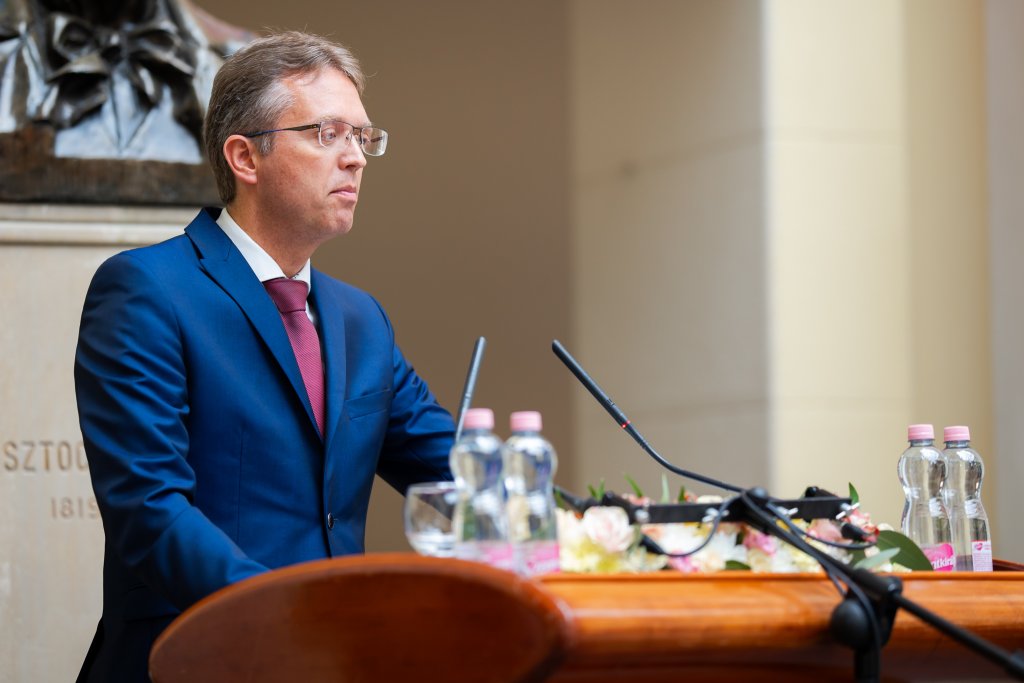
Balázs Hankó
Eszter Mozsár presented the merits of Botond Roska, this year’s recipient of the John von Neumann Professorship established together with the John von Neumann Computer Society. (The title of the Neumann Professorship may be awarded to Hungarian or foreign scientists with outstanding scientific achievements recognised internationally, whose area of science and activities are related to the scientific achievements of John von Neumann and whose activities are related to the BME.)
“Botond Roska is an internationally renowned scientist worthy of John von Neumann. His research work is related to the exploration of the mechanisms of vision and the restoration of vision in blind people. [...] Since 2014, he has been a professor of the University of Basel, as well as a founding member and director of the university’s Institute of Molecular and Clinical Ophthalmology since 2018. His research group played a decisive role in revealing the function of neurons in the retina, thalamus, and cortex. The group has developed a gene therapy that can restore the vision of those who have been visually impaired due to a genetic disorder. In 2018, they managed to grow a functional, artificial retina under laboratory conditions. [...]
Botond Roska is the winner of the Wolf Prize Medicine, the Order of Saint Stephen of Hungary, the Prima Primissima Award for Hungarian Science, and the International Prize for Translational Neuroscience. He was also awarded the Sanford and Susan Greenberg End Blindness Visionary Prize, the Louis-Jeantet Prize for Medicine, and the Körber European Science Prize for his outstanding research in the restoration of vision. He is a member or chairperson of several advisory boards and editorial boards.”
Together with Balázs Hankó and Levente Kovács, Charaf Hassan handed over the diploma and plaque certifying the award to Botond Roska. The recipient recalled that his father, Tamás Roska, was a professor at the BME: “He loved his job very much, so for 18 years I listened to him talking about how great it was to be an engineer”. He added that the mission of the BME is the same today as it was back then: to invest knowledge in Physics and Math in activities that have tangible benefits. He mentioned that originally he also planned to become a mathematician, and although he could not meet John von Neumann personally, he often came across “theses that were somehow related to him”.
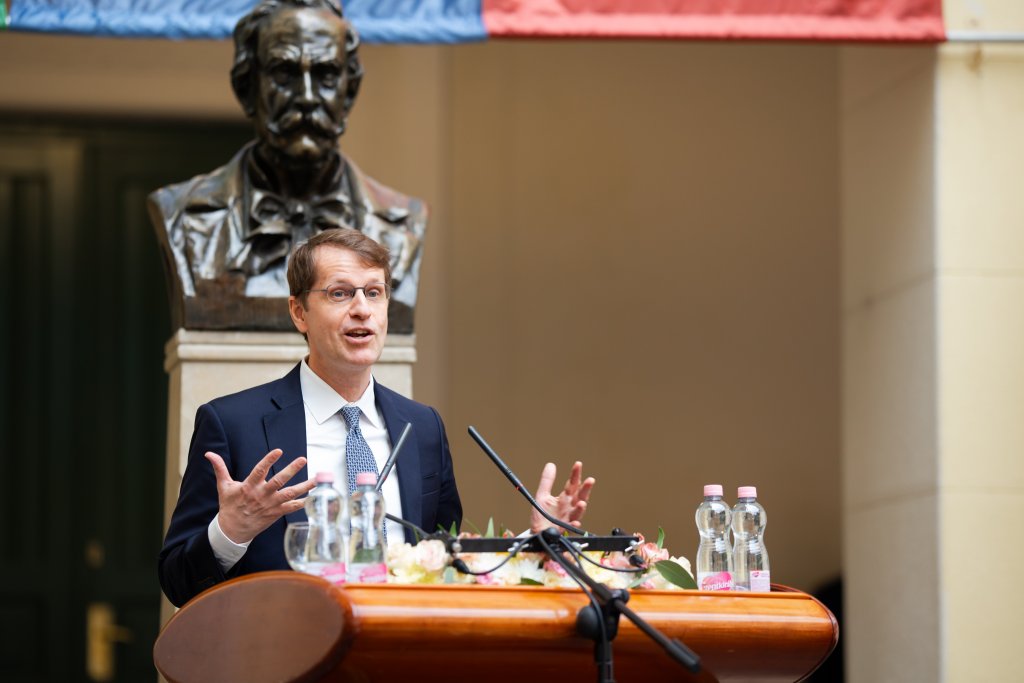
Botond Roska
Then in a short speech András Szarka presented Zoltán Demjén as a candidate for the Honorary Citizen of the University title. (The Senate may award this title to those who, with their support, activities, and behaviour representing the interests of the university, have made an outstanding contribution to improving the performance of the university’s teaching and research tasks as well as its international recognition, and are not in an employee relationship with the BME.)
Zoltán Demjén is a licensed chemical engineer, honorary associate professor, member of the Inorganic Chemistry and Materials Science Committee of the Hungarian Academy of Sciences, and a guest lecturer in the Application of Plastics course at the BME’s MSc training programme in Plastics and Fiber Technology. “He teaches the curriculum interestingly for students, with realistic examples and from an industrial point of view. He has been supporting the work of the George Oláh Doctoral School for decades with his selfless and devoted work,” said András Szarka about the recipient.
Accepting the proposal, Charaf Hassan handed over the diploma certifying the title of honorary citizen to Zoltán Demjén, who thanked him for the award and said, “My activity is far outweighed by what I have received from this institution, my lecturers and colleagues.” After recalling the milestones of his career, he concluded his speech by saying that, as when he was a student, there is still a huge demand for engineers and technology specialists today, and “I am glad to be a part of this training programme”.
The Technical University also inaugurated three honorary doctors this year. Imre Orbulov presented Alexander Fidlin, a member of the Technical Mechanics Institute of the Karlsruher Institute of Technology (KIT) in Germany. “Professor Fidlin has had a close professional relationship with BME lecturers since 2017. Since 2019, he has been a mentor to Hungarian students traveling from the BME’s Faculty of Mechanical Engineering to the KIT within the framework of our German-language engineering training. He played an instrumental role in preparing and organizing the further development of the programme into a two diploma-granting training programme,” said the dean of the GPK.
András Szarka presented Regine Schönlechner and Christian Müller. Regine Schönlechner is an internationally known researcher of cereal sciences, primarily small pseudo-cereals, and a lecturer in food science subjects at the Universität für Bodenkultur (BOKU) in Vienna. “It was also a unique initiative in the region to organize an English-language food technology laboratory course in the BOKU's well-equipped small-scale laboratories for the BME’s food science students for 15 years, which was coordinated by Dr. Schönlechner from the Austrian side,” said András Szarka.
Christian Müller is a professor in the Department of Inorganic Chemistry at the Freie Universität Berlin. He is an internationally recognized expert in the chemistry of low-coordination phosphorus compounds. “He has been collaborating with the Department of Inorganic and Analytical Chemistry of the BME for more than ten years, resulting in a number of high-quality scientific publications. In 2024, he supported the work of the department as a visiting professor for three months, launching a new research direction at the university,” praised Christian Müller the dean of the Faculty of Chemical Technology and Biotechnology.
After the speeches of the three new honorary doctors, the titles of Industry Professor were handed over. Imre Orbulov presented András Németh, a teacher of engineering, for his research and development and innovation achievements in the Hungarian plastic industry, and for his outstanding professional support in university education and research. István Varga presented István Szászi, the managing director of the Bosch Group, who, as a former student and assistant professor of the BME, plays a major role in the development of the corporate-university ecosystem, and is a regular guest lecturer at the Faculty Transportation Engineering and Vehicle Engineering to this day.
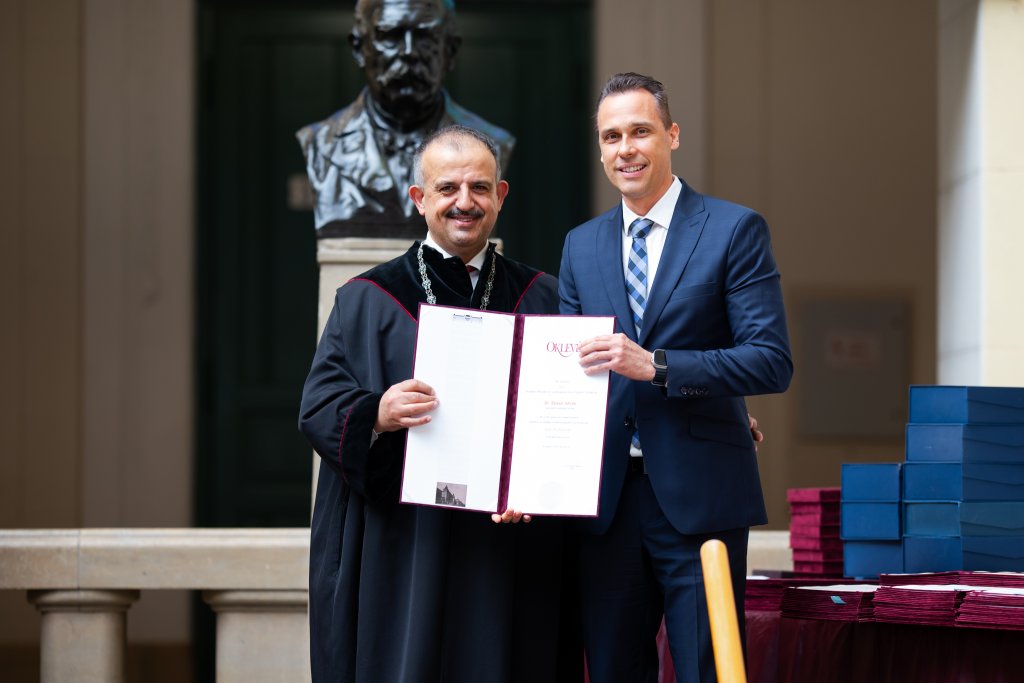
The most prestigious award of the BME, the Archduke Joseph Commemorative Medal, may be awarded to those whose outstanding teaching and scientific work and activities in increasing the university’s reputation have made them worthy of it, and who have promoted the development of the institution with their outstanding performance in administration, management, operation or other university field of work. This year, four people received the medal named after the founder of the university:
Honorary university professor Tibor Szalay, who carried out internationally recognized scientific and educational work at the BME for 41 years. Between 2008 and 2012, he worked as Vice Dean for Scientific and International Affairs of the Faculty of Mechanical Engineering, and between 2013 and 2023, he was the head of the Department of Manufacturing Science and Engineering.
Mihály Balázs is a university professor, winner of the Kossuth, Prima Primissima and Ybl architectural awards, who has been a lecturer at the Faculty of Architecture for more than four decades, and previously worked as the head of the Department of Public Building Design and the Doctoral School of Architecture. His former students are the country’s dominant architects and architectural lecturers today.
György János Marosi, Professor Emeritus, corresponding member of the Hungarian Academy of Sciences, Széchenyi Prize-winning inventor and research organizer, who conducts internationally renowned research in the development of pharmaceutical products. He is one of the most successful researchers of the BME.
Professor Emeritus István Frigyes, who died on 23 April 2025 at the age of 93, had conducted internationally recognized research and development activities in the field of wireless digital communications systems for more than 70 years. He was a committed lecturer of the BME for more than 42 years, assisted a number of students to the earn their academic degrees, and learned of his award a few days before his death.
The Senate established the József Sztoczek Commemorative Medal with the aim of rewarding university employees who served the interests of the University for several years with their outstanding performance in administration, management, operation, development or other field related to the institution. Ten employees of the BME were awarded with the medal at the ceremony:
Szilvia Báthory, née Gyáni, Administrator Expert of the Employment Department of the Human Resources Directorate,
Gabriella Csengey, Financial Administrator of the Directorate of Finance and Accounting of the Chancellery,
Anett Csögör-Szikora, Administrator Expert of the Directorate of Property Management of the Chancellery,
Zsuzsanna Teodóra Garancsi, Financial Administrator of the Department of Electronics Technology of the Faculty of Electrical Engineering and Informatics,
Tamás Igricz, Departmental Engineer of the Department of Organic Chemistry and Technology of the BME’s Faculty of Chemical Technology and Biotechnology,
Gabriella Eszter Korbuly, Educational Administrator of the Department of Geodesy and Surveying of the Faculty of Civil Engineering,
Éva Püski, Education Coordinator of the Department of Academic Affairs for Education of the Rector’s Office,
Krisztina Toldi, Financial Administrator of the Department of Manufacturing Science and Engineering of the Faculty of Mechanical Engineering,
Emőke Tünde Varga, née Édes, Head of the Dean’s Office of the Faculty of Economics and Social Sciences, and
Beáta Éva Veress, née Balogh, Deputy Director of the Central Academic Office.
The Pro Juventute Universitatis is awarded by the Senate, on the proposal of the Student Union of the University, to persons who have carried out outstanding activities for a long time in the interest of students. This year’s recipients are:
Györgyi Dallos, Office Manager of the Faculty of Electrical Engineering and Informatics
Zsolt Rémai, Assistant Professor of the Department of Geodesy and Geotechnics.
Next, excellent lecturers of the last two terms received the Excellent Lecturer of BME award, which can be granted to those lecturers on the proposal of the Student Union of the University, who were reviewed by at least 100 students on all the courses they taught, and finished in the top five. Charaf Hassan and Imre Lévai presented the award to the following lecturers:
György Bognár, Associate Professor of the Department of Electronic Devices,
Elvira Böcskei, Associate Professor of the Department of Finance,
Géza Csima, Assistant Professor of the Department of Algebra and Geometry,
Judit Csima, Associate Professor of the Department of Computer Science and Information Theory,
Nikol Krausz, Assistant Professor of the Department of Photogrammetry and Geoinformatics,
Balázs Lőrincz, PhD student of the Department of Physical Chemistry and Materials Science,
Tamás Milkovszki, Assistant Professor of the Department of Algebra and Geometry,
András Póra, Assistant Lecturer of the Department of Finance,
Júlia Szilágyi, née Kertész, Assistant Professor of the Department of Inorganic and Analytical Chemistry and
Bálint Máté Takács, Assistant Professor of the Department of Analysis and Operations Research.
The Alfréd Hajós Award for the best student athlete of the year was given to Dávid Nagy, a member of the gold medallist men’s duel fencing team of the 2024 Paris Olympics. Just in case anyone needs to refresh their memories of this great success: he became the 20th Olympic Champion of the BME.
László Nyulászi read out the list of those habilitated by the University’s Habilitation Committee this year, and then handed over the diplomas together with the rector. Habilitated lecturers:
István Bartók – For his study of the architectural role of proportionality;
Péter Bálint – For the study of unevenly hyperbolic billiards;
Tamás Csoknyai – For the energetics analysis of Hungarian residential buildings;
Péter Fejérdy – For his architectural work serving the sacrality and the community;
András Gulyás – For the development of complex networks;
Zoltán Imre Micskei – For developing automated control methods for critical software systems;
László Toka – For his achievements in the field of resource management in cloud systems;
Tamás Varga – For his achievements in project-based engineering design;
The Senate also inaugurated doctors at its ceremonial meeting. Szabolcs Rózsa (ÉMK) and Imre Orbulov (GPK) submitted 17 each, György Alföldi (ÉPK) 24, András Szarka (VBK) and Sándor Imre (VIK) 25 each, István Varga (KJK) 11, Attila Aszódi (TTK) 24, and Tamás Koltai (GTK) 6 candidates for the doctorate.
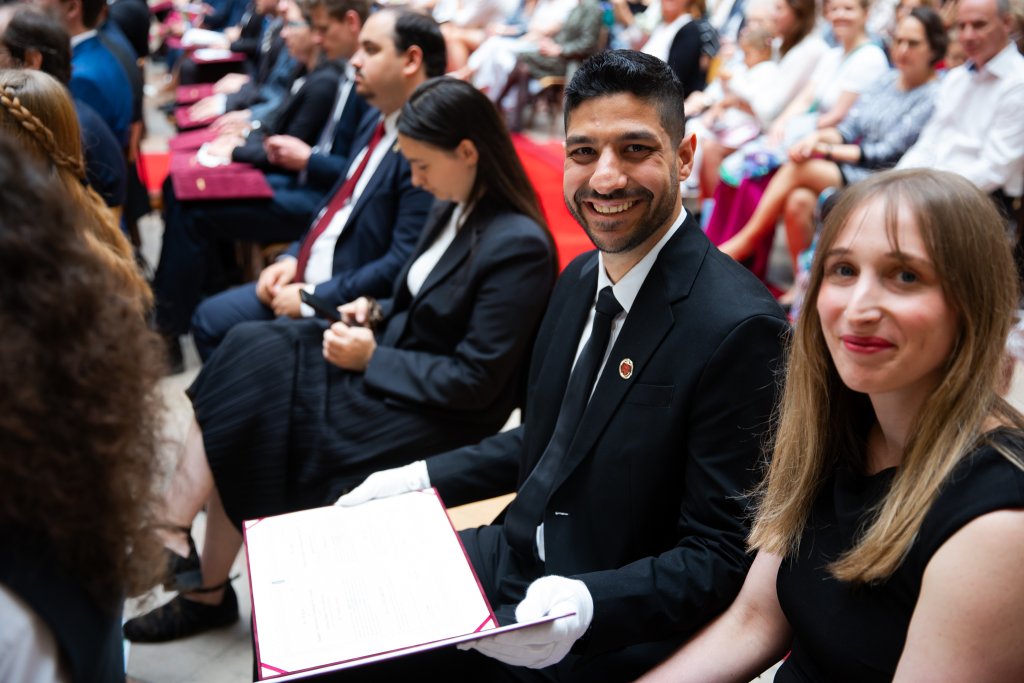
The meeting ended with “Szózat”, a Hungarian patriotic song.
Click here for the full video coverage of the meeting:
Rectors’s Office, Communications Directorate
